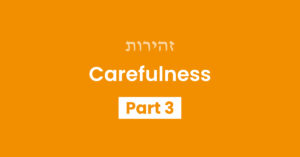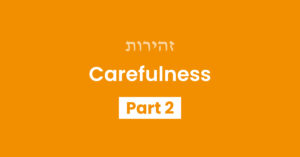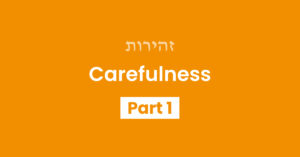In the past month, we have been focusing on the middah of Zehirus – being careful to perform mitzvos properly.
First, we explained that in order to act with Zehirus, we have to keep our eyes open and pay attention to what we’re doing. Next, we discussed how a prerequisite for Zehirus is knowing exactly what Hashem expects of us. The more we learn halachah and remember it clearly, the better equipped we will be to answer back to the yetzer hara when he tries to convince us that forbidden things are permitted, and vice versa.
Finally, we explored how sometimes, we are held back from performing mitzvos properly because we are worried about what other people will think of us. The key therefore is to remember: “The ONLY thing that matters is what Hashem thinks of me.” Of course, Hashem wants us to be well-liked people. But we must never let our desire to please other people outweigh our desire to do what’s right in Hashem’s Eyes.
Sometimes, though, when we are pushing ourselves to perform a mitzvah carefully, and it’s hard, the yetzer hara whispers to us a little question: Does it really matter?
Does Hashem really care if I cover my whole hand with water when I wash Netilas Yadayim? Does it really matter if I pronounce my brachos clearly, as long as I’m saying generally the right thing?
Why does Hashem care about these little details of my life? Doesn’t He have greater, more important things to worry about?
Why does Hashem care about these little details of my life?
There are many ways to approach this question, but here we will approach it from 2 different angles: (1) Hashem as our King; and (2) Hashem as our beloved.
Hashem as Our King
As we explained a few months ago, Hashem was King even before the world existed, as we say: “Adon Olam Asher Malach B’Terem Kol Yetzir Nivra – Hashem is the Master of the world Who reigned even before anything was created.” But even so, Hashem’s kingship could not be revealed in this world until mankind was created. Why not?
We explained that a key quality of a king is that everyone respects his wishes. That’s why it’s the greatest honor to a king when his servant says: “Yes, your majesty; your wish is my command!” A king’s will is supposed to be seen as the #1 priority in his kingdom. If anyone dares to transgress the king’s will, the king might chop off his head!
It doesn’t matter how big or small the king’s request is. If the king says: “Let’s go to war!” and one of his servants refuses, he has disrespected the king. Likewise, If the king makes a smaller request like: “Bring me a glass of wine!” and his servant brings grape juice, this, too is a tremendous disrespect to the king. It doesnt matter how “big” or “small” the command is;every time you fulfill the King’s wishes, you bring honor to his kingship. And every time you fail to fulfill the king’s wishes, it’s a disrespect to his honor.
We can now understand why Hashem cares so much that we should fulfill even the seemingly “smaller” mitzvos. Every time we fulfill a mitzvah – whether big or small – we are showing that we accept Hashem as our King and we see His Will as our #1 priority.
Every time we fulfill a mitzvah – whether big or small – we are showing that we accept Hashem as our King and we see His Will as our #1 priority.
Every time we do a mitzvah, we are showing that we care about fulfilling His royal wishes. It doesn’t matter how “big” or “small” that mitzvah is. Every time we say Modeh Ani in the morning, and every time we are careful not to move a muktzeh item on Shabbos, we are showing that we respect Hashem’s royal wishes, and through this, we are revealing His honor and glory in this world.
A Loving Relationship
A second way to approach this question is to remember that mitzvos are not like a dry business transaction or a point system. Rather, Hashem wants to have a deep, loving relationship with every one of us. And whenever you have a deep, loving relationship with someone, the details matter.
Hashem wants to have a deep, loving relationship with every one of us.
Imagine a wife who asks her husband: “Can you please go to the store and buy frozen broccoli florets? Not the ‘chopped’ broccoli, but the florets. And can you get the Bodek brand, not any other brand?”
Her husband doesn’t understand why she needs specifically florets and the Bodek brand. But he knows this is what his wife prefers, so he lovingly goes to do it anyway.
The more you show a person how much you care about their detailed preferences, the more it shows how much you love them.
The more you show a person how much you care about their detailed preferences, the more it shows how much you love them.
If your spouse, parent, child, or friend did ONLY the “big” things that they’re required to do in the relationship, you would feel like they are scraping by on the bare minimum. But when they do many the smaller, less significant acts for you, it proves that they care deeply about you and always have you on their mind.
This is why we must take care to do the seemingly “smaller” mitzvos for Hashem. When we make sure to wash netilas yadayim properly, or when we make sure to move a muktzeh item in a permitted manner, it’s as if we are saying to Hashem: “I care so much about You and I want to do whatever it takes to make You happy!”
“I care so much about You and I want to do whatever it takes to make You happy!”
That’s why it’s so important to make sure to perform even the minor mitzvos carefully. Every “little” mitzvah we do is so very meaningful to Hashem because it shows how much we care about our relationship, and care to reveal His Kingship in this world.
Your Challenge
The Mesilas Yesharim (Chapter 5) writes that a person should make regular times to do a Cheshbon HaNefesh – to make an accounting of how well he is keeping mitzvos. In order to grow, a person needs to keep track of his progress and see where he’s holding.
Identify 1 mitzvah that you could be more careful to perform it properly.
FOR EXAMPLE:
- Saying 1 brachah each day slowly, and pronouncing every word clearly
- Bowing all the way down during Shemoneh Esrei and Aleinu
- Not speaking lashon hara for 1 hour each day
- Remembering to say a brachah before and after eating
- Remembering to say Asher Yatzar after using the bathroom, or saying it clearly
- Saying Modeh Ani first thing in the morning while still in bed
- Saying Krias Shema Al HaMitta each night
- Washing netilas yadayim properly (To learn the halachos, see this shiur or this video)
Make a chart for yourself where you can put a checkmark for each day that you do the mitzvah properly.
Every time you do the mitzvah, try to think (optional): “I am doing this mitzvah because Hashem cares so much about every little mitzvah that I do.”




